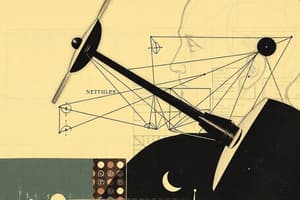Podcast
Questions and Answers
Which branch of physics deals with the behavior of objects in motion and their interactions with other objects and forces?
Which branch of physics deals with the behavior of objects in motion and their interactions with other objects and forces?
- Kinetics
- Dynamic mechanics (correct)
- Equilibrium mechanics
- Static mechanics
What is the fundamental principle of classical mechanics that states an object's motion is determined by the forces acting upon it and its initial conditions?
What is the fundamental principle of classical mechanics that states an object's motion is determined by the forces acting upon it and its initial conditions?
- Law of conservation of energy
- Principle of equilibrium
- Principle of inertia
- Law of motion (correct)
Which subfield of classical mechanics focuses on the study of objects at rest or in a state of equilibrium?
Which subfield of classical mechanics focuses on the study of objects at rest or in a state of equilibrium?
- Laws of motion
- Equilibrium dynamics
- Static mechanics (correct)
- Dynamic mechanics
What is the foundational concept on which classical mechanics is based?
What is the foundational concept on which classical mechanics is based?
What does classical mechanics primarily deal with?
What does classical mechanics primarily deal with?
According to Newton's first law of motion, what happens to an object at rest?
According to Newton's first law of motion, what happens to an object at rest?
What is the relationship between the acceleration of an object and the net force acting upon it, according to Newton's second law of motion?
What is the relationship between the acceleration of an object and the net force acting upon it, according to Newton's second law of motion?
What is the fundamental concept in classical mechanics related to energy and momentum?
What is the fundamental concept in classical mechanics related to energy and momentum?
According to classical mechanics, what happens to energy and momentum?
According to classical mechanics, what happens to energy and momentum?
What does classical mechanics primarily focus on?
What does classical mechanics primarily focus on?
What is electricity primarily a result of?
What is electricity primarily a result of?
What is electrostatics primarily concerned with?
What is electrostatics primarily concerned with?
What are the charged particles that carry electric charge?
What are the charged particles that carry electric charge?
What is the process of generating electricity primarily involve?
What is the process of generating electricity primarily involve?
What is the fundamental aspect of electricity in Class 10 related to?
What is the fundamental aspect of electricity in Class 10 related to?
What is the electrostatic field?
What is the electrostatic field?
What does Coulomb's Law describe?
What does Coulomb's Law describe?
What is resistance in electricity?
What is resistance in electricity?
What is electromagnetic induction?
What is electromagnetic induction?
What is alternating current (AC)?
What is alternating current (AC)?
Flashcards are hidden until you start studying
Study Notes
Physics: The Science of Matter and Energy
Physics is a fundamental science that deals with the study of matter and energy, their interactions, and the properties of the physical world. It is a diverse field, with its foundations rooted in classical mechanics. This article will explore the basics of physics, focusing on classical mechanics and its subtopics.
Classical Mechanics
Classical mechanics is a branch of physics that deals with the behavior of objects in motion, including their interactions with other objects and forces. It is based on the laws of motion and the principle of conservation of energy, which state that an object's motion is determined by the forces acting upon it and its initial conditions. Classical mechanics is divided into two main subfields: statics and dynamics.
Static Mechanics
Static mechanics, also known as equilibrium mechanics, focuses on the study of objects at rest or in a state of equilibrium. It involves the analysis of forces acting on an object and the resulting equilibrium conditions. The fundamental equations of statics include the laws of motion, which state that an object's motion is determined by the forces acting upon it and its initial conditions.
Dynamic Mechanics
Dynamic mechanics, also known as kinetics, deals with the study of objects in motion. It involves the analysis of forces acting on an object and the resulting motion. The fundamental equations of dynamics include Newton's laws of motion, which state that an object's motion is determined by the forces acting upon it and its initial conditions.
Laws of Motion
Newton's laws of motion are the foundation of classical mechanics. They state that the acceleration of an object is directly proportional to the net force acting upon it and inversely proportional to its mass. The three laws are as follows:
- First Law: An object at rest stays at rest, and an object in motion stays in motion unless acted upon by an unbalanced force.
- Second Law: The acceleration of an object is directly proportional to the net force acting upon it and inversely proportional to its mass.
- Third Law: For every action, there is an equal and opposite reaction.
Conservation Laws
The principle of conservation of energy and momentum is a fundamental concept in classical mechanics. It states that energy and momentum cannot be created or destroyed, only transferred or converted from one form to another. This principle is essential for understanding the behavior of objects in motion and the interactions between them.
Applications of Classical Mechanics
Classical mechanics has numerous applications in various fields, including engineering, robotics, and astronomy. It allows for the design and analysis of structures, machines, and systems, as well as the understanding and prediction of celestial phenomena.
In conclusion, physics is a vast and diverse field that deals with the study of matter and energy. Classical mechanics is a fundamental subfield that focuses on the behavior of objects in motion and the forces that act upon them. Newton's laws of motion and the principles of conservation of energy and momentum are essential concepts in classical mechanics, with numerous applications in engineering, robotics, and astronomy.
Studying That Suits You
Use AI to generate personalized quizzes and flashcards to suit your learning preferences.




